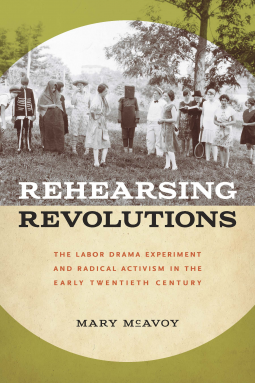
Rehearsing Revolutions
The Labor Drama Experiment and Radical Activism in the Early Twentieth Century
by Mary McAvoy
This title was previously available on NetGalley and is now archived.
Send NetGalley books directly to your Kindle or Kindle app
1
To read on a Kindle or Kindle app, please add kindle@netgalley.com as an approved email address to receive files in your Amazon account. Click here for step-by-step instructions.
2
Also find your Kindle email address within your Amazon account, and enter it here.
Pub Date Jun 17 2019 | Archive Date Jun 15 2019
University of Iowa Press | University Of Iowa Press
Talking about this book? Use #RehearsingRevolutions #NetGalley. More hashtag tips!
Description
Choice Outstanding Academic Title, 2019
George Freedley Memorial Award Finalist, 2020
Between the world wars, several labor colleges sprouted up across the U.S. These schools, funded by unions, sought to provide members with adult education while also indoctrinating them into the cause. As Mary McAvoy reveals, a big part of that learning experience centered on the schools’ drama programs. For the first time, Rehearsing Revolutions shows how these left-leaning drama programs prepared American workers for the “on-the-ground” activism emerging across the country. In fact, McAvoy argues, these amateur stages served as training grounds for radical social activism in early twentieth-century America.Using a wealth of previously unpublished material such as director’s reports, course materials, playscripts, and reviews, McAvoy traces the programs’ evolution from experimental teaching tool to radically politicized training that inspired overt—even militant—labor activism by the late 1930s. All the while, she keeps an eye on larger trends in public life, connecting interwar labor drama to post-war arts-based activism in response to McCarthyism, the Cold War, and the Civil Rights movement. Ultimately, McAvoy asks: What did labor drama do for the workers’ colleges and why did they pursue it? She finds her answer through several different case studies in places like the Portland Labor College and the Highlander Folk School in Tennessee.
Advance Praise
“In illuminating theatrical activity at workers’ colleges, McAvoy offers an insightful vision into the pervasiveness and power of theatre in American culture.”—Fonzie D. Geary II, Lyon College
“The book makes a significant contribution to twentieth-century leftist theatre scholarship by introducing archival materials heretofore forgotten or ignored. Additionally, in a time period when the humanities continue to come under attack for their ‘insignificance,’ the author explicates how even failed attempts at educational change are consequential.”—Chrystyna Dail, author, Stage for Action: U.S. Social Activist Theatre in the 1940s
Available Editions
| EDITION | Other Format |
| ISBN | 9781609386412 |
| PRICE | $90.00 (USD) |
| PAGES | 266 |
Links
Featured Reviews
 Cristie U, Book Trade Professional
Cristie U, Book Trade Professional
The author's painstaking research and attention to detail is obvious in the writing of this book. There were many facts that I only discovered after reading this!
 Reviewer 492564
Reviewer 492564
McAvoy offers a compelling and fascinating study of some of the most important theatrical experiments of the twentieth century: the drama and theater of labor colleges and organizations. Long-ignored, here projects involved playwrights, actors, and others interested in the state of labor and labor movements i.n the US. Using thousands of primary source documents and paying close attention to the work already done on labor and the arts, McAvoy crafts a detailed and important assessment of these projects and their effects in theater, the labor movement, and individual careers. This is a must-read for anyone interested or working in American theater, the history of labor movements and work, and the arts in early twentieth century America.



